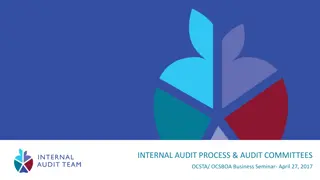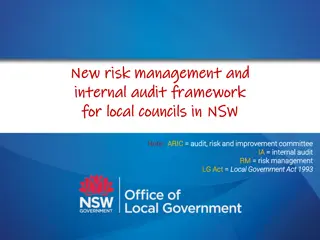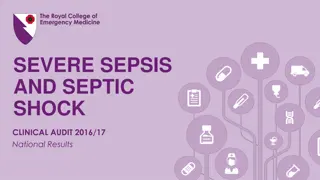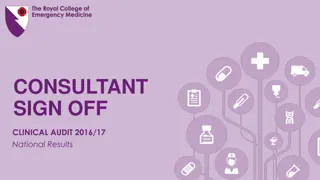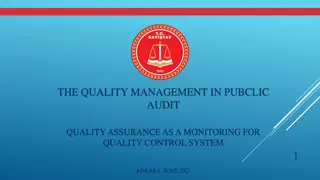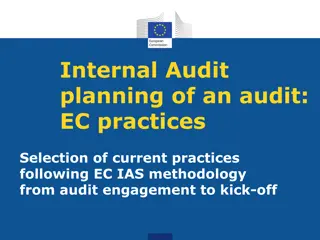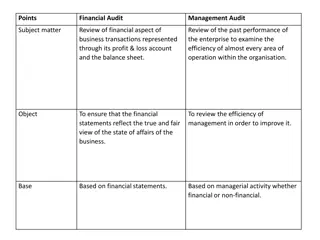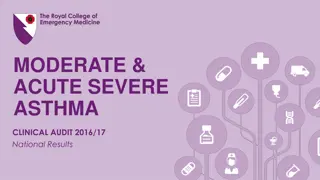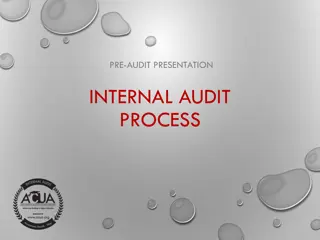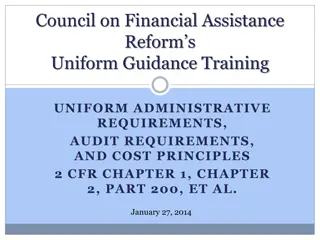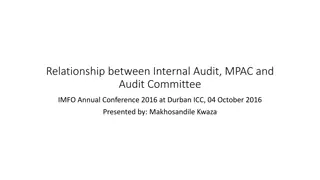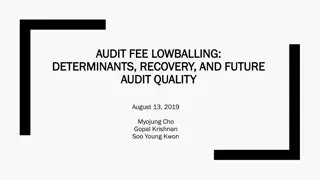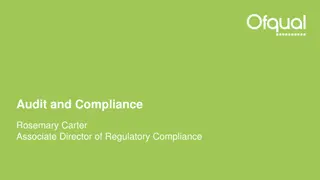Public Sector Audit Committees in Europe: Survey Results and Regulatory Insights
The content discusses the existence and regulation of audit committees in the public sector across Europe, based on a mid-2016 survey involving respondents from 22 out of 50 EUROSAI Members. It highlights the varied practices in different countries, the established audit committees in certain jurisdictions, and the regulatory frameworks governing them, including corporate law and governance rules. The survey also touches upon the presence of audit committee charters in select jurisdictions.
Download Presentation

Please find below an Image/Link to download the presentation.
The content on the website is provided AS IS for your information and personal use only. It may not be sold, licensed, or shared on other websites without obtaining consent from the author.If you encounter any issues during the download, it is possible that the publisher has removed the file from their server.
You are allowed to download the files provided on this website for personal or commercial use, subject to the condition that they are used lawfully. All files are the property of their respective owners.
The content on the website is provided AS IS for your information and personal use only. It may not be sold, licensed, or shared on other websites without obtaining consent from the author.
E N D
Presentation Transcript
Joint Seminar Brussels 2017 1
Public Sector Audit Committees EUROSAI survey results EUROSAI-ECIIA general conclusions Wim Fran ois Philip Mariscal Court of Audit of Belgium 2
Survey participation Survey mid-2016 Survey respondents: SAIs of Austria, Belgium, Bulgaria, Czech Republic, Denmark, Estonia, European CoA, Finland, Germany, Ireland, Kazakhstan, Latvia, Lithuania, Malta, Moldova, Netherlands, Poland, Portugal, Romania, Serbia, Spain, Turkey i.e. 22 out of 50 EUROSAI Members (limitation of scope!) 3
Existence of audit committees There is no overall tendency to have audit committees in the public sector in Europe, except for: - some countries, firmly established and for all public sector entities (Ireland, Netherlands) or for a considerable number of entities (Belgium federal and regional entities, European Union institutions, Malta, Poland ministries, Romania ministries); - some types of entities, in particular public enterprises (Austria, Belgium, Estonia, Germany, Portugal, Serbia, Spain, Turkey) or State-owned undertakings (Lithuania). In some countries there are only one or a few public sector entities having an audit committee (Latvia). In Denmark there is only one public sector audit committee, regulated in the Danish Constitution, the Public Accounts Committee. In some countries there is new legislation to set up audit committees for some public sector entities (Bulgaria). 4
Regulation of audit committees Audit committees are regulated by hard and/or soft law: - corporate law and corporate governance rules (Austria, Portugal, Turkey), - public enterprises law (Belgium, Germany, Serbia), - public sector governance law, mainly laws on internal control and audit (Belgium, Bulgaria, Estonia, Latvia national AC, Malta national AC, Po- land, Romania, Spain), - public sector governance rules (Ireland, Netherlands ministries AC, Poland, Serbia), - organic laws of public sector entities (Netherlands parastatals AC), - the Constitution and complementary law (Denmark), - the Financial Regulation (European Union institutions AC). 5
Audit committee charters Respondents of a limited number of jurisdictions have confirmed there are audit committee charters (Belgium, EU institutions, Ireland, Malta, Portugal, Romania). According to this information these charters sometimes have to be approved by the government or the governing body (Belgium federal AC, EU institutions, Portugal). 6
Composition of audit committees The number of audit committee members varies from 2 to 10 persons (from 2-3 in Spain, 7 in Belgium, to 7-10 in Netherlands ministries AC; 9 in European Commission Audit Progress Committee). Audit committee members usually have a term of 3 to 6 years, sometimes once renewable. In most jurisdictions the audit committee should collectively have sufficient expertise concerning relevant fields/matters (Belgium). Usually at least one or two member(s) must have specialized or expert knowledge (Belgium), in some countries all members. In several countries the chairperson, a minority of members, a majority of members (Belgium regional AC) or all members (Belgium federal AC) of the audit committee must be independent from the entity, i.e. external members. 7
Examples The audit committee should collectively have sufficient expertise concerning relevant fields/matters, e.g. public sector activities, budget cycle, ICT, public management, public law, internal control, strategic management, risk management (Belgium, Ireland, Poland). Usually at least one or two member(s) must have specialized or expert knowledge, e.g. in the area of finance, accounting and reporting, auditing (Austria, Belgium, Estonia, Ireland, Malta, Netherlands, Poland, Serbia); in some countries all members (Bulgaria, Latvia, Romania). 8
Examples The chairperson :Austria, a minority of members :EU Commission, Netherlands ministries AC, a majority of members :Belgium regional AC, Bulgaria, Spain, or all members :Belgium federal AC, Estonia, Latvia national AC, Portugal, Romania, Serbia) of the audit committee must be independent from the entity; in Ireland some AC have internal members, some external; in Malta, Poland and the Netherlands AC are composed of a mixture of internal and external members. In some countries audit committee members elect the chairperson among them (Belgium, Denmark). 9
Roles and responsibilities of AC The roles and responsibilities of typical audit committees include overseeing or reviewing: - accounting and financial reporting; - internal control systems; - risk management; - internal auditing process; - external auditing process. In some countries audit committees oversee additional topics, e.g. budget preparation, compliance, operational management, ethics, whistle-blowing, selection of auditors. 10
Reporting of audit committees The audit committees report to: - Parliament (Denmark); - Ministers: competent Ministers or Council of Ministers (Belgium federal AC), Prime Minister, competent Ministers and Minister of Finance, Ministry of Finance; Minister of Finance in case of senior manager neglecting recommendations; - Board: supervisory board, body or person that elected AC, governing body, permanent secretary or board of directors, board of directors, supervisory board; - Manager: senior manager, accounting officer of ministry or CEO, secretary general of ministry, head of entity; - All stakeholders. 11
AC relationships with internal audit The situation is similar in most jurisdictions. Basically they have to: - safeguard the (independent) status of internal audit entities; - oversee the planning, progress and results of internal audit activities. In most jurisdictions the audit committee is consulted on the internal audit work program. In some countries the (initial) annual internal audit plan must be approved by the audit committee (Belgium), or the audit committee sets priorities for strategic and annual internal audit plans. 12
AC relationships with the SAI If there is a relationship between audit committees and SAIs, it ranges from SAIs auditing audit committees to an audit committee commissioning and reviewing the SAI: - audit committee subject of SAI audits, as part of the audited organization (Belgium federal AC); - informal contacts: during SAI audit work, on implementation of certain legislation (Belgium federal AC), SAI participation as observer or invitee in audit committee meetings (Belgium French-speaking AC), on follow-up of recommendations; - formal cooperation agreement on audits (Belgium Flemish AC), SAI membership of audit committee; - audit committee commissioning SAI audits and reviewing SAI reports (Denmark). 13
Assessment of benefits and effectiveness of AC Only in a limited number of responding jurisdictions the benefits and/or effectiveness of audit committees have been assessed by other entities or persons. In some countries with a mature AC setup there is (Belgium Flemish AC), or may exist in the near future, some kind of audit committee self-assessment. 14
Examples The Flemish AC in Belgium and the ministries ACs in the Netherlands must do regular (annual) self-evaluations. In Poland the AC regulating Minister of Finance issued an AC self- evaluation questionnaire. In Ireland the SAI has recommended the government department that issues AC guidance to develop a self-assessment tool. 15
Benefits and effectiveness of AC Some benefits have been reported by several jurisdictions: - strengthened independence of internal audit (Belgium); - improved quality of internal audit activities (Belgium); - improved internal control systems (Belgium); - better focused decision-making by governing bodies. Some areas to be improved in mature AC jurisdictions include: - independence and selection of AC members; - performance assessment and measuring of AC effectiveness. 16
General conclusions (1) General conclusions shared by EUROSAI and ECIIA concerning the surveyed jurisdictions (important limitation of scope!) - Only a few jurisdictions present a more or less generalized and mature public sector AC configuration: (1) UK, Ireland, Netherlands; (2) Belgium, EU, Malta, Poland, Romania; (3) Denmark (special case). For the remainder public sector AC are clearly limited to public enterprises, i.e. market entities. - The legal framework concerning public sector AC is very heterogeneous, reflecting national/regional characteristics of the public sector. - The composition of public sector AC is very diverse; independent, external AC membership is not self-evident, even in mature public sector AC jurisdictions. 17
General conclusions (2) - relationships with internal audit are more or less similar. - Reporting lines of public sector AC obviously depend to a large extent on the legal setup of the AC. - Relationships of public sector AC with the SAI are in general not well established nor formalized. - Only in a limited number of jurisdictions with public sector AC, their performance or effectiveness has been assessed; self-assessments obviously exist only in (some) mature public sector AC jurisdictions. The main roles and responsibilities of public sector AC and their 18
General conclusions (3) As we have noted for public sector internal auditing and SAI-IA relations in Europe (joint paper 2014), the public sector AC landscape in Europe seems to be very diverse. Most jurisdictions would benefit from more international sharing of information on public sector AC, in particular information on best practices concerning the issues mentioned above. The crucial question remains whether political stakeholders (Parliaments, Governments, governing bodies of public sector entities) can be convinced of the added value of AC for their national, regional or local public sector. They will only get convinced if the (efficiency and) effectiveness of public sector AC is assessed and demonstrated. SAIs and public sector IA, obviously taking into account their national public law settings, may have a (bigger) role to play in this respect. 19





